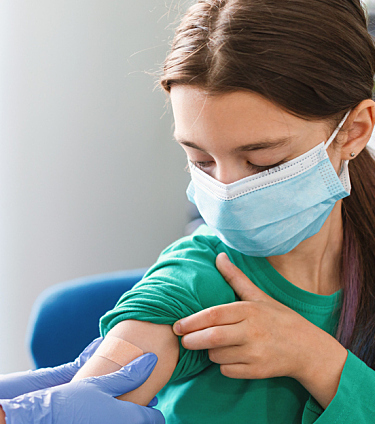

As you juggle your family's busy lives and schedules, don't forget to make sure your kids are up to date on their vaccines.* Vaccines for teens are essential to protect them from serious diseases (and their complications). Vaccinations also help build the community's immunity — so their teammates, school friends and family members are less likely to get sick.
Many school districts require certain vaccines for students and staff, given that the potential for vaccine-preventable disease transmission is higher in these spaces due to close contact. Check out your child's school manual to see which vaccinations they will need for the following school year. Your healthcare provider and local Bartell store will be happy to provide vaccinations for your child in the coming year.
Common Vaccines for Teens
Here are some common teenage vaccines that their school, sports teams or other organizations might require to keep them healthy.
DTaP or Tdap
This vaccine protects against diphtheria, tetanus and pertussis (whooping cough).
Infants and children receive five doses of DTaP in the early years. However, protection from these diseases decreases with time. That's why another vaccine — Tdap — is needed during the tween years, according to the Centers for Disease Control and Prevention (CDC).
A single dose of Tdap is recommended at 11 to 12 years old.
HPV
HPV (human papillomavirus) is a common virus that can cause certain cancers in men and women later in life. The first HPV vaccine was approved in 2006 and protected against four types of HPV. In 2014, the vaccine was reformulated to protect against nine HPV types.
The HPV vaccine works extremely well and has the potential to prevent more than 90% of HPV-attributable cancers, including cervical, vulvar, vaginal, anal and certain head and neck cancers. It also protects against precancerous cervical, vulvar, vaginal and anal lesions, and genital warts. Keep in mind that these diseases may have many causes. The HPV vaccine only protects against the nine HPV types covered by the vaccine.
HPV vaccines are often given to children around 11 to 12 years old. For best protection, they'll need to get two doses, at least 6 to 12 months apart by the time they're 15 years old.
Meningococcal
Although meningococcal disease can affect anyone, teens and young adults ages 16 through 23 are more likely to be at risk. Meningococcal bacteria can cause severe, even deadly, infections like meningitis (which impacts the lining of the brain and spinal cord) or bacteremia or septicemia (bloodstream infections), according to the CDC.
All 11- to 12-year-olds should receive a single dose of the meningococcal conjugate vaccine. It's recommended they get a booster dose at age 16 to enhance protection during their most at-risk years, particularly during college as the disease tends to spread when students live in close quarters.
The CDC recommends that teens and young adults (ages 18-23) at high risk for meningococcal disease also receive a serogroup B meningococcal (MenB) vaccine. The preferred timing of vaccination is between ages 16 and 18. Teens and young adults in this age group who are not at increased risk may also receive the MenB vaccine if they wish.
Flu
The flu is an acute respiratory infection caused by influenza viruses. These viruses morph every year and flu vaccines are updated to protect against the viral strains expected to cause illness in the upcoming flu season. Protection from the flu vaccine also wanes over time. That's why it's recommended that all children ages 6 months and older (and adults!) get a flu vaccine each year.
It's best to get the flu vaccine early in the flu season to help prevent the disease and minimize symptoms, according to the World Health Organization.
The flu vaccine is available as a shot or a nasal spray. Teens with certain health conditions, like asthma, should not receive the nasal spray formulation.
COVID-19
COVID-19 vaccines can protect against the viruses that cause COVID-19 and help reduce the severity of symptoms should someone become infected with the virus. The CDC recommends that everyone stay up to date on COVID-19 vaccines.
In general, one dose of an updated 2023-2024 COVID-19 vaccine is recommended for everyone aged 5 years and older to protect against serious illness from COVID-19. Additional doses may be necessary for high-risk individuals and for those who have never been vaccinated, depending on the brand of vaccine administered.
Catch-Up Vaccines for Continued Protection
Your child might have missed some vaccines when they were younger, and they now need to play catch up. Healthcare providers can create a catch-up vaccination plan tailored to your teen's individual needs — addressing any health issues they have while ensuring they're caught up. Make sure you stick to the schedule your healthcare provider creates for your child to ensure that the vaccine results in maximum protection. Talk to your doctor about recommended vaccinations available, which may include the following:
- Hepatitis B
- Hepatitis A
- Pneumococcal conjugate vaccine (pneumonia)
- MMR (measles, mumps and rubella)
- IPV (polio)
- Varicella (chicken pox)
Most vaccines can be administered by your pediatrician or schedule an appointment at your local Bartell pharmacy. Following the recommended vaccine schedule and catching up on missed doses will allow you to ensure comprehensive protection during your child's formative years, building a healthier future for everyone.
*Some vaccinations may be contraindicated in certain individuals. Your pharmacist or healthcare professional will help determine your vaccination eligibility.
These articles are intended for informational purposes only and are not a substitute for professional medical advice, diagnosis, or treatment and are not intended to treat or cure any disease. Never disregard professional medical advice or delay in seeking it because of something you have read in these articles. Advances in medicine may cause this information to become outdated, invalid, or subject to debate. Professional opinions and interpretations of scientific literature may vary. Consult your healthcare professional before making changes to your diet, exercise or medication regimen.



